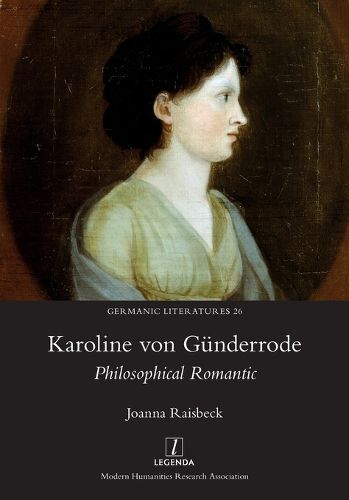Readings Newsletter
Become a Readings Member to make your shopping experience even easier.
Sign in or sign up for free!
You’re not far away from qualifying for FREE standard shipping within Australia
You’ve qualified for FREE standard shipping within Australia
The cart is loading…






This title is printed to order. This book may have been self-published. If so, we cannot guarantee the quality of the content. In the main most books will have gone through the editing process however some may not. We therefore suggest that you be aware of this before ordering this book. If in doubt check either the author or publisher’s details as we are unable to accept any returns unless they are faulty. Please contact us if you have any questions.
Karoline von Guenderrode's biography - and in particular her early death - have long overshadowed an appreciation of her literary works. Closer attention to her poems, prose writings and plays reveals Guenderrode's remarkable engagement with the philosophical, literary, and scientific debates of her age. Joanna Raisbeck's study is the first to uncover a consistent theme throughout Guenderrode, one which stems from the desire to combat the prevalent philosophical dangers of both materialism and atheism. Guenderrode, it emerges, is the most consistent thinker of Spinozist pantheism - the idea that God and nature are the same - not just in German Romanticism, but in her age. Guenderrode uses a new interpretation of Spinoza as a means to write about questions of determinism, autonomy, and what differences there might be, if at all, between humankind and nature.
Joanna Raisbeck is Lecturer in German at St Hilda's College and Wadham College, University of Oxford. She is the winner of both the Klaus Heyne-Award for Research in German Romanticism (2021) and the Novalis Prize (2022) for her work on Guenderrode.
$9.00 standard shipping within Australia
FREE standard shipping within Australia for orders over $100.00
Express & International shipping calculated at checkout
This title is printed to order. This book may have been self-published. If so, we cannot guarantee the quality of the content. In the main most books will have gone through the editing process however some may not. We therefore suggest that you be aware of this before ordering this book. If in doubt check either the author or publisher’s details as we are unable to accept any returns unless they are faulty. Please contact us if you have any questions.
Karoline von Guenderrode's biography - and in particular her early death - have long overshadowed an appreciation of her literary works. Closer attention to her poems, prose writings and plays reveals Guenderrode's remarkable engagement with the philosophical, literary, and scientific debates of her age. Joanna Raisbeck's study is the first to uncover a consistent theme throughout Guenderrode, one which stems from the desire to combat the prevalent philosophical dangers of both materialism and atheism. Guenderrode, it emerges, is the most consistent thinker of Spinozist pantheism - the idea that God and nature are the same - not just in German Romanticism, but in her age. Guenderrode uses a new interpretation of Spinoza as a means to write about questions of determinism, autonomy, and what differences there might be, if at all, between humankind and nature.
Joanna Raisbeck is Lecturer in German at St Hilda's College and Wadham College, University of Oxford. She is the winner of both the Klaus Heyne-Award for Research in German Romanticism (2021) and the Novalis Prize (2022) for her work on Guenderrode.